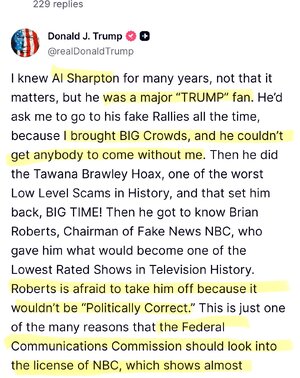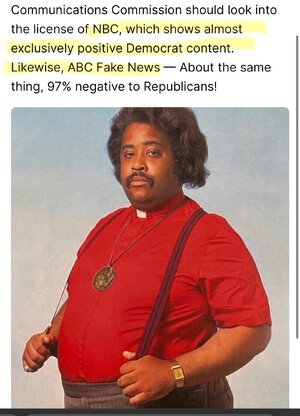lawtig02
Legend of ZZL
- Messages
- 5,461
This is such a great read, and a castration of the lawyers doing Trump's bidding -- https://storage.courtlistener.com/recap/gov.uscourts.flmd.447437/gov.uscourts.flmd.447437.5.0.pdf
As every member of the bar of every federal court knows (or is presumed to know), Rule 8(a), Federal Rules of Civil Procedure, requires that a complaint include “a short and plain statement of the claim showing that the pleader is entitled to relief.” Rule 8(e)(1) helpfully adds that “[e]ach averment of a pleading shall be simple, concise, and direct.” Some pleadings are necessarily longer than others. The difference likely depends on the number of parties and claims, the complexity of the governing facts, and the duration and scope of pertinent events. But both a shorter pleading and a longer pleading must comprise “simple, concise, and direct” allegations that offer a “short and plain statement of the claim.” Rule 8 governs every pleading in a federal court, regardless of the amount in controversy, the identity of the parties, the skill or reputation of the counsel, the urgency or importance (real or imagined) of the dispute, or any public interest at issue in the dispute.
In this action, a prominent American citizen (perhaps the most prominent American citizen) alleges defamation by a prominent American newspaper publisher (perhaps the most prominent American newspaper publisher) and by several other corporate and natural persons. Alleging only two simple counts of defamation, the complaint consumes eighty-five pages. Count I appears on page eighty, and Count II appears on page eighty-three. Pages one through seventy-nine, plus part of page eighty, present allegations common to both counts and to all defendants. Each count alleges a claim against each defendant and, apparently, each claim seeks the same remedy against each defendant.
Even under the most generous and lenient application of Rule 8, the complaint is decidedly improper and impermissible. The pleader initially alleges an electoral victory by President Trump “in historic fashion” — by “trouncing” the opponent — and alludes to “persistent election interference from the legacy media, led most notoriously by the New York Times.” The pleader alludes to “the halcyon days” of the newspaper but complains that the newspaper has become a “full throated mouthpiece of the Democrat party,” which allegedly resulted in the “deranged endorsement” of President Trump’s principal opponent in the most recent presidential election. The reader of the complaint must labor through allegations, such as “a new journalistic low for the hopelessly compromised and tarnished ‘Gray Lady.’” The reader must endure an allegation of “the desperate need to defame with a partisan spear rather than report with an authentic looking glass” and an allegation that “the false narrative about ‘The Apprentice’ was just the tip of Defendants’ melting iceberg of falsehoods.” Similarly, in one of many, often repetitive, and laudatory (toward President Trump) but superfluous allegations, the pleader states, “‘The Apprentice’ represented the cultural magnitude of President Trump’s singular brilliance, which captured the [Z]eitgeist of our time.”
The complaint continues with allegations in defense of President Trump’s father and the acquisition of the Trumps’ wealth; with a protracted list of the many properties owned, developed, or managed by The Trump Organization and a list of President Trump’s many books; with a long account of the history of “The Apprentice”; with an extensive list of President Trump’s “media appearances”; with a detailed account of other legal actions both by and against President Trump, including an account of the “Russia Collusion Hoax” and incidents of alleged “lawfare” against President Trump; and with much more, persistently alleged in abundant, florid, and enervating detail.
Even assuming that each allegation in the complaint is true (of course, that is for a jury to decide and is not pertinent here; this order suggests nothing about the truth of the allegations or the validity of the claims but addresses only the manner of the presentation of the allegations in the complaint); even assuming that at trial the plaintiff offers evidence supporting every allegation in the complaint and that the evidence is accepted by the jury as fact; and even assuming that after finally “melting” the defendants’ alleged “iceberg of falsehoods” the plaintiff prevails for each reason alleged in the complaint — even assuming all of that — a complaint remains an improper and impermissible place for the tedious and burdensome aggregation of prospective evidence, for the rehearsal of tendentious arguments, or for the protracted recitation and explanation of legal authority putatively supporting the pleader’s claim for relief. As every lawyer knows (or is presumed to know), a complaint is not a public forum for vituperation and invective — not a protected platform to rage against an adversary. A complaint is not a megaphone for public relations or a podium for a passionate oration at a political rally or the functional equivalent of the Hyde Park Speakers’ Corner.
A complaint is a mechanism to fairly, precisely, directly, soberly, and economically inform the defendants — in a professionally constrained manner consistent with the dignity of the adversarial process in an Article III court of the United States — of the nature and content of the claims. A complaint is a short, plain, direct statement of allegations of fact sufficient to create a facially plausible claim for relief and sufficient to permit the formulation of an informed response. Although lawyers receive a modicum of expressive latitude in pleading the claim of a client, the complaint in this action extends far beyond the outer bound of that latitude.
This complaint stands unmistakably and inexcusably athwart the requirements of Rule 8. This action will begin, will continue, and will end in accord with the rules of procedure and in a professional and dignified manner. The complaint is STRUCK with leave to amend within twenty-eight days. The amended complaint must not exceed forty pages, excluding only the caption, the signature, and any attachment.
ORDERED in Tampa, Florida, on September 19, 2025.
As every member of the bar of every federal court knows (or is presumed to know), Rule 8(a), Federal Rules of Civil Procedure, requires that a complaint include “a short and plain statement of the claim showing that the pleader is entitled to relief.” Rule 8(e)(1) helpfully adds that “[e]ach averment of a pleading shall be simple, concise, and direct.” Some pleadings are necessarily longer than others. The difference likely depends on the number of parties and claims, the complexity of the governing facts, and the duration and scope of pertinent events. But both a shorter pleading and a longer pleading must comprise “simple, concise, and direct” allegations that offer a “short and plain statement of the claim.” Rule 8 governs every pleading in a federal court, regardless of the amount in controversy, the identity of the parties, the skill or reputation of the counsel, the urgency or importance (real or imagined) of the dispute, or any public interest at issue in the dispute.
In this action, a prominent American citizen (perhaps the most prominent American citizen) alleges defamation by a prominent American newspaper publisher (perhaps the most prominent American newspaper publisher) and by several other corporate and natural persons. Alleging only two simple counts of defamation, the complaint consumes eighty-five pages. Count I appears on page eighty, and Count II appears on page eighty-three. Pages one through seventy-nine, plus part of page eighty, present allegations common to both counts and to all defendants. Each count alleges a claim against each defendant and, apparently, each claim seeks the same remedy against each defendant.
Even under the most generous and lenient application of Rule 8, the complaint is decidedly improper and impermissible. The pleader initially alleges an electoral victory by President Trump “in historic fashion” — by “trouncing” the opponent — and alludes to “persistent election interference from the legacy media, led most notoriously by the New York Times.” The pleader alludes to “the halcyon days” of the newspaper but complains that the newspaper has become a “full throated mouthpiece of the Democrat party,” which allegedly resulted in the “deranged endorsement” of President Trump’s principal opponent in the most recent presidential election. The reader of the complaint must labor through allegations, such as “a new journalistic low for the hopelessly compromised and tarnished ‘Gray Lady.’” The reader must endure an allegation of “the desperate need to defame with a partisan spear rather than report with an authentic looking glass” and an allegation that “the false narrative about ‘The Apprentice’ was just the tip of Defendants’ melting iceberg of falsehoods.” Similarly, in one of many, often repetitive, and laudatory (toward President Trump) but superfluous allegations, the pleader states, “‘The Apprentice’ represented the cultural magnitude of President Trump’s singular brilliance, which captured the [Z]eitgeist of our time.”
The complaint continues with allegations in defense of President Trump’s father and the acquisition of the Trumps’ wealth; with a protracted list of the many properties owned, developed, or managed by The Trump Organization and a list of President Trump’s many books; with a long account of the history of “The Apprentice”; with an extensive list of President Trump’s “media appearances”; with a detailed account of other legal actions both by and against President Trump, including an account of the “Russia Collusion Hoax” and incidents of alleged “lawfare” against President Trump; and with much more, persistently alleged in abundant, florid, and enervating detail.
Even assuming that each allegation in the complaint is true (of course, that is for a jury to decide and is not pertinent here; this order suggests nothing about the truth of the allegations or the validity of the claims but addresses only the manner of the presentation of the allegations in the complaint); even assuming that at trial the plaintiff offers evidence supporting every allegation in the complaint and that the evidence is accepted by the jury as fact; and even assuming that after finally “melting” the defendants’ alleged “iceberg of falsehoods” the plaintiff prevails for each reason alleged in the complaint — even assuming all of that — a complaint remains an improper and impermissible place for the tedious and burdensome aggregation of prospective evidence, for the rehearsal of tendentious arguments, or for the protracted recitation and explanation of legal authority putatively supporting the pleader’s claim for relief. As every lawyer knows (or is presumed to know), a complaint is not a public forum for vituperation and invective — not a protected platform to rage against an adversary. A complaint is not a megaphone for public relations or a podium for a passionate oration at a political rally or the functional equivalent of the Hyde Park Speakers’ Corner.
A complaint is a mechanism to fairly, precisely, directly, soberly, and economically inform the defendants — in a professionally constrained manner consistent with the dignity of the adversarial process in an Article III court of the United States — of the nature and content of the claims. A complaint is a short, plain, direct statement of allegations of fact sufficient to create a facially plausible claim for relief and sufficient to permit the formulation of an informed response. Although lawyers receive a modicum of expressive latitude in pleading the claim of a client, the complaint in this action extends far beyond the outer bound of that latitude.
This complaint stands unmistakably and inexcusably athwart the requirements of Rule 8. This action will begin, will continue, and will end in accord with the rules of procedure and in a professional and dignified manner. The complaint is STRUCK with leave to amend within twenty-eight days. The amended complaint must not exceed forty pages, excluding only the caption, the signature, and any attachment.
ORDERED in Tampa, Florida, on September 19, 2025.





